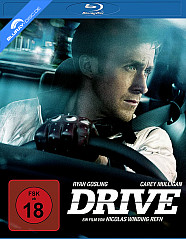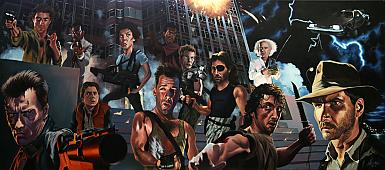Interview with Director
Nicolas Winding Refn on
'Drive'
One thing that’s so satisfying
about Drive is how much is not said and over-explained.
Was it a struggle or fight to pare the script down, in that
fashion?
Nicolas Winding
Refn: "Nope, it came out of me not liking talking.
I feel that silence is the greatest word, ever. I just wanted them
to look at each other because it’s the purity of love. It’s like
seeing your first love. You just look at her. Because he (Ryan
Gosling) is a man of silence, in the sense that he is a character
that only speaks when he is spoken to or when he has something to
say, and that automatically makes him mythological, in the sense
that, when you don’t talk, people begin to read things into you or
you become what they long for. When you don’t talk, you almost
become the mirror image of the other person. When I did Valhalla
Rising with Mads Mikkelsen, he was mute all the way through. I was
very interesting in that kind of storytelling, working with
protagonists that don’t speak."
Do you find that actors have a
more difficult time dealing with that?
Nicolas Winding
Refn: "It’s the hardest thing for an actor not to
speak because you take away their main tool. So for an actor, it’s
very frustrating and very challenging, and very few people can pull
it off. But, Ryan is one of those few actors that can say a
thousand words with just a look, and it’s a unique gift. Very few
people have ever had that gift."
What about Carey Mulligan?
Nicolas Winding Refn: "Same thing. The love story
within them is heightened because of that. It’s never defined. It’s
just pure and almost innocent, in a way. That’s because the Driver
protects innocence against evil. It’s very much structured like a
fairy tale. I had been reading Grimm’s fairy tales to my eldest
daughter a few years ago and I thought, 'Well, it would be
interesting to make a movie like a fairy tale.' So when this came
up, that was the style I wanted to do it in."
Does that also revitalize a genre, to just do it in its
purest form?
Nicolas Winding Refn: "Yeah, I believe the
stronger the purity, the stronger the drama."
Can you talk about the
importance of the music in the film?
Nicolas Winding Refn: "Well, the music was very
important. I don’t do drugs anymore, and so music very much gets me
going. I’m a fetish filmmaker in that I don’t know why I do what I
do, I just like to see things. When I figure out what I would like
to see, I will put it in a film. When I do something, I think, 'If
it was a piece of music, what would it be?' Kraftwerk, from the
'70s, created electronic music and very crude instruments, and that
was very similar to the Driver being a machine, but he’s an antique
machine. He drives an antique car. So, knowing that I always wanted
electronic music, that was the inspiration. I would listen to a lot
of very early electronic music, and that was it. It was that whole
Euro sound. And then, after I had chosen the songs I had Cliff
Martinez emulate that specific sound."
Do you use music on the
set?
Nicolas Winding Refn: "On the set, and then when I
write it or when I think about it. I would even walk around with my
iPod on through all the scenes when I was shooting, listening to
specific kinds of music."
In this film it seems very
easy for people to kill people. Were you exploring how easily you
could just end someone?
Nicolas Winding Refn: "Like fairy tales, once the
bad guys are judged, it’s always very vicious, but it’s always in
one sentence like, 'And they died a violent ending.' It’s very
quick. I felt that violence works when it’s quick and
unpredictable."
Is there a limit to how far
you can push the violence in a movie like
this?
Nicolas Winding Refn: "No, I don’t think there’s
any limit. It’s just about how you do it. But, you must understand
that violence is only a tool. If it’s used badly, it will be
horrible. If it’s used correctly, it can be very interesting. But,
essentially, it’s just a tool."
Are there other directors who
you think use violence well?
Nicolas Winding Refn: "Well, I think that Sam
Peckinpah certainly was one of the great masters of violent cinema.
John Ford certainly had a very violent impulse in his films and
characters. John Woo is another example. [Jean-Pierre] Melville
from France is a good example. I always admire Tony Scott’s films.
People use it in different kinds of ways."
So, you and Ryan Gosling
really clicked and you’re going to do another project
together?
Nicolas Winding Refn: "We’re doing two movies
together. We’re doing
Only God Forgives in February, and
then we’re doing
Logan’s Run."
Logan's Run is still
on?
Nicolas Winding Refn: "Oh, yeah. When I have a
script that I’m happy with, that Ryan is happy with, and that
Warner Bros. is happy with, then we’ll make the movie."
Are you close to that?
Nicolas Winding Refn: "I’m close to presenting how
I would like to make it."
Knowing that sci-fi movies
like to over-explain things, would you be able to strip the
dialogue from that?
Nicolas Winding Refn: "Well, that’s the big trick.
Sometimes over-explaining it is actually what makes it more
complicated."
What is it about Logan’s
Run that made you think that it was due for a
remake?
Nicolas Winding Refn: "I’ve always been obsessed
with the film, ever since I was little. So when they called and
asked if I was interested, my answer was just, 'Yes! Yes! Yes!
Yes!'"
Why is it so difficult to get
that film off the ground?
Nicolas Winding Refn: "I haven’t been in the other
meetings or been around with it before, but I know they’ve been
trying to make it for 25 years. I think one of the problems maybe
has been that they’ve been trying to remake the original film,
which is impossible because it’s already dated. How do you remake
something that’s dated, about the future which is much more
advanced?"
DRIVE hits theaters on September 16, 2011
and is rated R for strong brutal bloody violence, language and some
nudity.
Quelle:
By Rebecca Murray, About.com Guide













